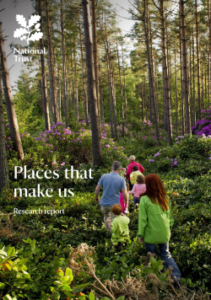 Scientific research carried out by the National Trust has found that natural and historic places have a powerful effect on all of us, as their ‘Places that Make us’ report demonstrates the depth of people’s connection with place.
Scientific research carried out by the National Trust has found that natural and historic places have a powerful effect on all of us, as their ‘Places that Make us’ report demonstrates the depth of people’s connection with place.
The National Trust writes:
Is there a place that’s part of who you are? Somewhere you feel more like you? As a conservation charity, with the help of our supporters, we look after the places that we believe bring us genuine happiness and wellbeing. Now, for the first time, it’s possible to investigate this belief using pioneering brain-scanning techniques at the University of Surrey.
We also spoke to more than 2,000 people across the country, to find out what special places mean to them.
What did the research uncover?
Although we know which parts of the brain we use when we think about places, nobody has tried to measure the emotional impact of these places before. We wanted to understand the depth of people’s connection with place so we undertook a research experiment to find out. The detailed results can be found in our Places That Make Us report, which you’ll find a link to at the end of this article. In the first part of the research 20 people took part in an experiment, at the University of Surrey.
Researchers at the university measured volunteers’ brain activity while the volunteers were shown pictures of landscapes, houses, other locations and personally meaningful objects. Places with strong personal ties caused their brains to get excited, more excited than looking at any of the other photographs. Specifically, the scanning showed that an area of the brain associated with emotional responses, called the amygdala, was fired up. This tells us that we have special relationships with places. Meaningful places have a significance that personal possessions, or more general locations, don’t share.
In a second part of the research we surveyed more than 2,000 people, asking about their connections to meaningful places. For many, childhood memories are important. For others, a link to loved ones forges a special attachment to a particular place. More surprising was that for over 40 per cent of those we surveyed, their meaningful places were recent discoveries. Whether it’s with family, alone or just out walking the dog, it seems we visit these places to relax, enjoy nature or simply get away from our everyday cares.
Whatever they might be, our participants agreed strongly on three feelings about favourite places:
1.A feeling of belonging
2.Feeling physically and emotionally safe
3.Being driven there by a strong internal pull
What else do places give us?
The participants in our survey also told us about the calm and joy they experience. Many people said that a visit to their meaningful place grounds them, helps them ease stress and gives them much needed ‘me-time’. These feelings can be hard to put into words, but all point to a sense of positive wellbeing. Visiting special places moves people in many ways. For many, the strongest feelings they could describe were of calm, joy and contentment, energy and a sense of belonging.
